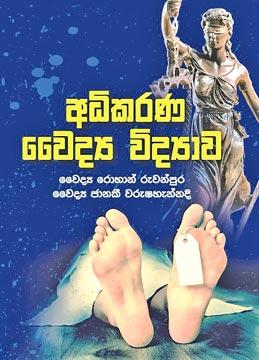
Adhikarana Vaidya Vidyava
Authors: Dr Rohan Ruwanpura and Dr Janaki Warushahennedi
Sarasavi Publishers, Nugegoda
Price: Rs 600
Forensic medicine is a specialized area of medical practice, concerned with the relationship between medicine and law. More specifically, it is the scientific use of medical and para-medical specialities as well as various dental, psychological, biological, chemical, and mechanical techniques in investigating the cause of a person’s death, disability, injury, or disease. Forensic medicine is particularly used in the pursuit of justice in court proceedings and in the protection of the public from environmental hazards.
Forensic medicine is not a new subject. It was used in ancient times to determine whether someone’s death was a result of natural causes, a suicide or a homicide. Practitioners of forensic medicine are called in to determine the cause of someone’s death.
The examination of the dead body came to be known as an autopsy or the scientific procedure for determining the cause of death. Forensic pathology grew in scientific stature with the establishment of a forensic institute at the University of Edinburgh in 1807. Similar institutes were established in other universities to train pathologists in medico-legal techniques.
The authors of the book have explained different aspects of forensic medicine, mainly for the general readership.
Most people have no knowledge of the subject as it involves medicine and the law. The authors have been acknowledged as experts in the field and their explanation of complicated areas of the subject will be useful to the reader.
First book
This is perhaps the first book written in Sinhala on forensic medicine. In 22 chapters the authors have explained the concept of expert evidence, medical negligence, clinical forensic examination, confidentiality of medical practice, examination of drug addicts, forensic psychiatry and a host of other related topics. Readers will find the chapters on sexual assault, torture, firearm injuries, explosives, crime scene investigations and finger prints interesting.
Today, we hear of many road accidents and how pedestrians get injured or killed. Sometimes, people get electrocuted.
There are also infant deaths, abortions and infanticide. Sometimes, people swallow insecticide or eat poisonous plants and seeds. In all such situations, forensic medicine has an important role to play.
Law and medicine
Ordinary people have no knowledge of medicine or the law. Even most lawyers have no knowledge of medicine.
Similarly, most doctors have not studied the law. The reason is that law and medicine are two different broad subjects. However, those who practise forensic medicine have gained qualifications in both disciplines. Without this rare combination, nobody can practise forensic medicine.
The book is useful for those involved in medico-legal professions, public officers, law and medical students. What is more, it is an ideal book on forensic medicine for the average reader.
